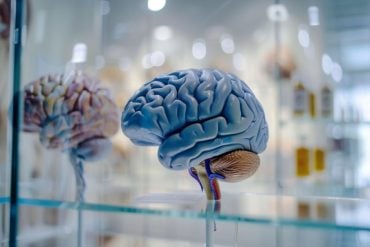Summary: Music may help children with hearing impairments to develop spoken language skills.
Source: University of Helsinki
When developing a music playschool designed for children using a cochlear implant, University Lecturer of Logopedics and speech therapist Ritva Torppa noticed that music, especially singing, benefits the brain of hearing-impaired children and their spoken language. The goal of the music playschool, speech-music group, is to improve the perception of speech and spoken language.
In an article published in the Hearing Research journal, Torppa and Professor of Education, brain researcher Minna Huotilainen assembled their own findings and those of other researchers which demonstrate that musical activities develop children’s perception of prosody, such as rhythm and pitch variation, and spoken language.
“These skills make children’s lives easier,” Torppa explains. “Listening to speech, for example, in noisy surroundings becomes less stressful while communicating with others and absorbing information in school and everyday life also becomes easier”.

Employing music in education benefits all
Huotilainen emphasises the principle of equality. Employing music in early childhood education and basic education benefits all and safeguards the right to high-quality learning for children with language disorders, those learning Finnish as a second language and children with developmental disabilities.
“The use of musical methods in teaching intensifies learning and is in line with the results of the latest brain research,” Huotilainen notes.
According to her, music also gives every child and young person a voice of their own, a channel for self-expression and the chance to be heard. Huotilainen is hoping for musical skills to be better acknowledged in the training of early childhood educators and basic education teachers.
“It would be great if the musical skills already acquired before university studies could be acknowledged at the entrance examination stage,” she suggests.
Basic guidelines for using music are included in the article published in Hearing Research and available in Finnish on the Cicero Learning network website. The guidelines are suitable for everyone regardless of the type of hearing disability.
Source:
University of Helsinki
Media Contacts:
Ritva Torppa – University of Helsinki
Image Source:
The image is credited to the University of Helsinki.
Original Research: Open access
“Why and how music can be used to rehabilitate and develop speech and language skills in hearing-impaired children”. Ritva Torppa, Minna Huotilainen.
Hearing Research. doi:10.1016/j.heares.2019.06.003
Abstract
Why and how music can be used to rehabilitate and develop speech and language skills in hearing-impaired children
This paper presents evidence for a strong connection between the development of speech and language skills and musical activities of children and adolescents with hearing impairment and/or cochlear implants. This conclusion is partially based on findings for typically hearing children and adolescents, showing better speech and language skills in children and adolescents with musical training, and importantly, showing increases of speech and language skills in children and adolescents taking part in musical training. Further, studies of hearing-impaired children show connections between musical skills, involvement in musical hobbies, and speech and language skills. Even though the field is still lacking large-scale randomised controlled trials on the effects of musical interventions on the speech and language skills of children and adolescents with hearing impairments and cochlear implants, the current evidence seems enough to urge speech therapists, music therapists, music teachers, parents, and children and adolescents with hearing impairments and/or cochlear implants to start using music for enhancing speech and language skills. For this reason, we give our recommendations on how to use music for language skill enhancement in this group.






